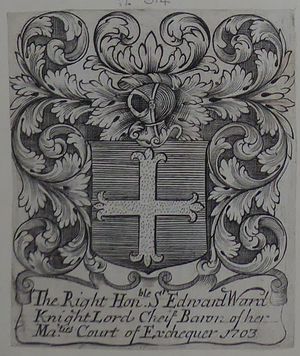Edward Ward 1638-1714
Sir Edward WARD 1638-1714
Biographical Note
Son of William Ward of Preston, Rutland. Admitted at the Inner Temple, 1664 (barrister, 1670). He quickly developed a successful legal practice and was appointed a judge in 1689, but chose (for financial reasons) not to sit; he became attorney-general in 1693, and was knighted the same year. He was made chief Baron of the Exchequer in 1695 and continued a judicial career thereafter, combined with other state offices.
Books
Ward used an engraved armorial bookplate dated 1703 (Franks *314). In his will, he directed that his wife should keep such books (and other goods) as she had at the time of his death. He divided his printed law books, and law manuscripts, between his sons Edward and Philip, on condition that none of the manuscripts be printed or lent outside the family. Any law books not required by the brothers were to go to his grandson Edward Hunt, "if and when he shall begin to study the law". All his other (non-law) books were to be divided into lots and distributed around his wife and surviving children. The size of the library is not known, but these provisions suggest that it was extensive. Some of his manuscript notebooks and reports are now in Lincoln's Inn.
Characteristic Markings
None of Ward's books have been identified.
Sources
- Will of Sir Edward Ward, The National Archives PROB 11/541/224.
- Gambier Howe, E. R. J. Franks bequest: catalogue of British and American book plates bequeathed to the ... British Museum. London, 1903.
- Menefee, Samuel Pyeatt, and Stuart Handley. "Ward, Sir Edward (1638–1714), lawyer and judge." Oxford Dictionary of National Biography.
